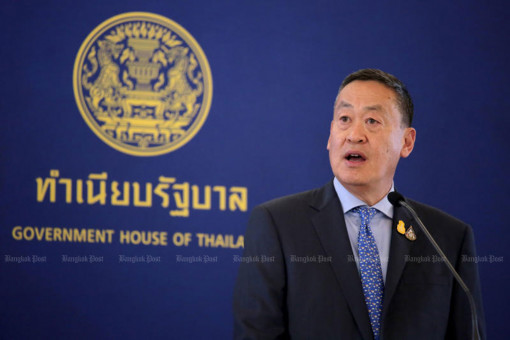PM outlines measures including lower interest rates, debt suspension and consolidation

Prime Minister Srettha Thavisin has announced relief measures, including debt suspension and reduced interest rates, to help resolve debt problems faced by 10.3 million people.
The government hopes the measures will help to pare down household debt totalling 16 trillion baht, or 90% of gross domestic product, which has become an major drag on the economy.
At a news conference on Tuesday, Mr Srettha divided the debtors into four groups: those who were affected by the Covid-19 pandemic, those who have regular income but huge debts, those who had unstable incomes that affected repayment ability, and those who have had bad debts for a long period of time.
All groups had one problem in common, he said: an inability to make instalment payments consistently. The more problematic their debt became, the higher their interest charges became, and they became trapped in a vicious circle of being unable to repay the debt. This resulted in many of them being added to the National Credit Bureau blacklist, said Mr Srettha, who is also the finance minister.
The government’s relief measures are based on the causes of each group’s problems, he said.
The first group of debtors normally had good repayment records, but the pandemic affected their cash flow, resulting in poor liquidity. This affected their ability to write off loans, which became bad debts. Debt suspensions were needed for this group, said the prime minister.
The government has instructed the Government Savings Bank and the Bank for Agriculture and Agricultural Cooperatives to help small debtors with bad debts. The state-run banks were told to collect debts based on appropriateness. About 1.1 million small debtors are expected to receive help.
About 100,000 small and medium-sized enterprise (SME) debtors, meanwhile, would be asked to undergo debt restructuring and their debts would be suspended.
The second group of debtors with permanent incomes but huge debts mostly comprises teachers, police and soldiers. They will get help in three ways: reduced interest rates, debt consolidation, and appropriate salary deduction levels so that they can service debts and still have money left for daily living. About 900,000 teachers face debt problems that could be resolved in this way.
The group of debtors with uncertain incomes comprises farmers and many debtors of the Student Loan Fund.
Debt restructuring, interest rate reductions and the scrapping of loan guarantors would be introduced to help debtors of the Student Loan Fund. Farmers would be offered a three-year debt suspension, said Mr Srettha.
The fourth group — those who have had bad debts with state financial institutions for a long period — would have their debts transferred to joint-venture asset management firms for restructuring. This measure would help about 3 million people, he said.
“Debtors will be able to enter debt clinics … and we will reduce risk across the financial system going forward,” Mr Srettha said at the press conference.
There will be additional measures to improve financial management and savings programmes, he added.
“In the long run we will improve credit and risk assessment of institutions … and financial management skills of the public,” he said.

